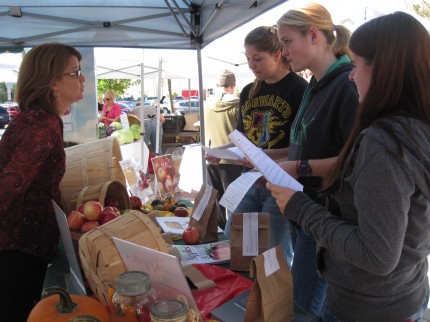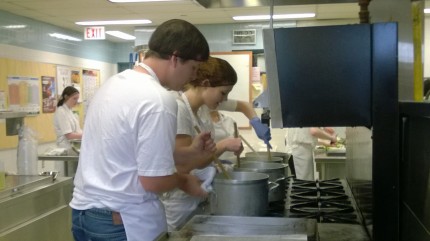Ecosource Brings Local Food to Durham Schools
Posted: October 27, 2014
Categories: Edible Education Network / Edible Education Project Profiles
 Ecosource, based out of the Region of Peel, works throughout the community and in schools, delivering interactive learning experiences to inspire youth and adults to take direct action in supporting a healthy environment and planet.
Ecosource, based out of the Region of Peel, works throughout the community and in schools, delivering interactive learning experiences to inspire youth and adults to take direct action in supporting a healthy environment and planet.
They have continued their work on institutional food procurement into Durham Region, through a recently-celebrated Cafeteria Connects project, where they worked to bring local food into Durham District School Board (DDSB) cafeterias.
A partnership between Ecosource, Durham District School Board, and Compass Group Canada (the board’s food service provider), the Cafeteria Connects project aims to increase local food offerings within school cafeterias while also providing educational opportunities for students and staff to better understand food systems and food choices. The idea is for the learning in the classroom to be backed up by the purchasing practices of the school board and the cafeteria – modeling the importance of students gaining a good understanding of the local food system through curriculum and experiential learning, while providing students with the opportunity to put these new ideas into action by showcasing options to purchase local in their school environments.
With the lessons in the classroom being supported by real school decisions, the notion of local, healthy eating becomes more universal. Broader lessons inherently come out of it as well, growing students’ knowledge around our local economies. Soni Craik, Ecosource’s School Food Program Manager, tells us that kids become more engaged when they understand the food system on this deeper level.
Working with the fresh produce distributer Bamford’s, and Compass Group Canada, Ecosource completed an exhaustive, essential process to collect baseline data in understanding what food was currently coming in to Durham. This illuminated for the group what substitutes could be made based on price and availability to local products.
Carrots, mushrooms, red peppers, cucumbers, cooking onions and apples were 6 items identified in a simple but cutting edge Purchasing Strategy the partners are calling, “The Big Ontario 6“. These items are high commodity fresh produce items already coming into DDSB cafeteria sites, and also items that can consistently be sourced from Ontario farms for the majority of the school year. This is the first Purchasing Strategy of its kind in Ontario public school boards, and a great place to start for the DDSB in better understanding where their food is coming from and who they are supporting through their purchasing practices.
For the 2014-2015 school year, students and staff will be able to identify these 6 Ontario items in their cafeteria’s offerings, and thanks to innovative communication pieces, even be able to identify the farms and Ontario communities these products are coming from.
And as stated earlier, it’s not just purchasing power, the project brings the learning right into classrooms as well. Last year, Ecosource piloted hospitality workshops that connect students to local food systems – they look at topics such as how much energy is required to move food through a system, what happens when we chose local, and impacts of food choices. The lessons work in conjunction with actually getting local food into the school cooking labs, so students see these local food chains being applied in real life, and truly understand the benefits of eating and supporting local.
Last year there were 4 hospitality workshops, which consisted of 2 days with an Ecosource staff member (Soni herself goes into the classrooms)! The first day is a workshop in the classroom, learning about the local food system, and the second day they actually get to cook with some of the local food. The success of these hospitality workshops saw them expand the workshop to 5 other schools this September at the Cafeteria Connects Farmer’s Market Day. The workshops and project learning has also helped to launch a new research project at Ecosource called Alternative Avenues to Local Food Procurement in Ontario Schools, which explores local food procurement opportunities, challenges and projects around local food procurement in school food programs.
This integrated approach certainly instills important food literacy skills in a powerful way, and helps to meaningfully ingrain the concept of local food support; and it becomes a valuable learning experience not just for the students, but also the teachers and school boards.
The Cafeteria Connects project has also created a curriculum package, written by 6 Durham teachers in the subjects of business, geography, science, family studies and hospitality. They’ve written 16 curriculum-linked lessons in the 5 subject areas, linking learning outcomes to local food. The package will be available to all Durham secondary school teachers to help connect the new food items and practices in the cafeteria to real curriculum and subject learning objectives; again, closing the loop between what we learn and how we behave.
Below, Soni Craik offers some more details (and tips) into the Cafeteria Connects project, check it out:
Q&A
How is your program funded?
The Cafeteria Connects project is funded by the Greenbelt Fund, who have been a major supporter of Ecosource local food programming since 2006.
How did you connect with the Durham District School Board?
The support and interest from DDSB was inspired by our work with the Peel District School Board. We’ve worked with Peel schools on local food initiatives on a number of levels (outreach, workshops, field trips, cooking contest) over the past 8 years.
In 2010, Ecosource partnered on with the PDSB, Compass Group Canada and Peel Public Health on the award winning project ‘School Food Action Coalition‘ to keep students engagement and interest on new school food offerings being implemented through the School Food and Beverage policy.
The success of that project in regards to food procurement, new food policies, quality of work and celebration of the board through the coalition sparked interest from the Durham District School Board to begin their own local food project.
Tips for others
We wanted to make sure this project hit all levels of the school board and operation system, and so we wanted to make sure we had a strong team to bring these ideas to fruition.
We created a multi-stakeholder strategy committee in Durham, consisting of school board trustees, a purchasing communication manager, curriculum leads, district managers, and an Ecosource manager.
Multi-stakeholder committees are key to the success for working with food in an institution. There are a number of aspects and points of view to think of and consider when working in something as complex as an institutional food system, and having a diverse team helps you cover all angles. For example, it is not possible to change the food system in an institution without engaging the food service provider and their food distributers in the project.
In an educational institution, student success must be tied into the project, so curriculum leads in the strategy committee can help identify and create opportunities to bring the learning into the classroom and identify how the initiative contributes to the success and learning of the student body.
Representatives from Purchasing and Finance bring to the table considerations that need to be taken into account around cost increase and contractual obligation, ensuring the system changes are sustainable.
In general, make sure you have the right decision makers – people who are able to influence the processes you are focusing your attention on. Relationships are incredibly important, as is building trust amongst your team.
Finally, understand and collect baseline data – if we’re looking to shift to local food, we have to understand the food that is currently coming into the institution, and knowing what food is coming in gives us a good overview of potential for change.
What was one of the biggest challenges you’ve come up against and how did you address it?
While the diverse strategy committee is a major strength, it can also be a challenge. Every representative comes with their own interest in local food and has their own point of focus; this can lead to competing visions and interests, and it can be difficult in the beginning to understand where to direct your efforts.
To get everyone on the same page we went through a very extensive visioning process to create a specific vision statement for the Cafeteria Connects project. Vision statements can be exhaustive, but it’s worth the work. We looked deeply at school food system for DDSB and asked ourselves – what do we want it to say about our community? The following statement was the result of that process. It takes into account the concerns and points of view of each of the Strategy Committee members and is the backbone of the actions we take in the project:
The Cafeteria Connects Strategy Committee aspires to engage DDSB students as active stakeholders in school food by providing education and action opportunities for students to learn about the benefits of nutritious food options. We will promote the support of Ontario agriculture by modeling local food purchasing practices, providing to students a variety of appealing and affordable food options. Our school food system will be used as an opportunity to create community connections, provide educational opportunities and consider the environmental impacts of our food choices.
What factors were critical for your success?
Collecting that baseline data, and having distributers on board and engaged helped us better understand the whole process.
We’ve been working with Bamford’s as the fresh produce provider for Durham cafeterias, and they’ve been incredible at helping us to better understand fresh produce and what we could substitute for local in Durham.
You need to work with the relationships that are already in place and honor that business (between school boards, their food service providers and their distributors). Institutions may work with large scale food distributors and we need to engage with them to understand the current climate in the produce and product relationships they have, as well as help to encourage and identify new opportunities that are possible to increase the amount of local available.
Let’s wrap up with a testimonial…
“Working with this project has been great! My students benefited from having specialized and knowledgeable instruction on the topic of local foods. They were engaged by unique lessons and activities that would not have been available to them otherwise. A great collaborative experience that I am happy to recommend and am looking forward to using again next school year.” – Chef Michael Holmes, Hospitality Lead Teacher, Sinclair Secondary School.
For this profile, we spoke with:
Soni Craik
Ecosource, School Food Program Manager
scraik@ecosource.ca
905-274-6222
www.ecosource.ca
This profile is part of a series of profiles for the Ontario Edible Education Network.
Be sure to check out more profiles from the Network here!
